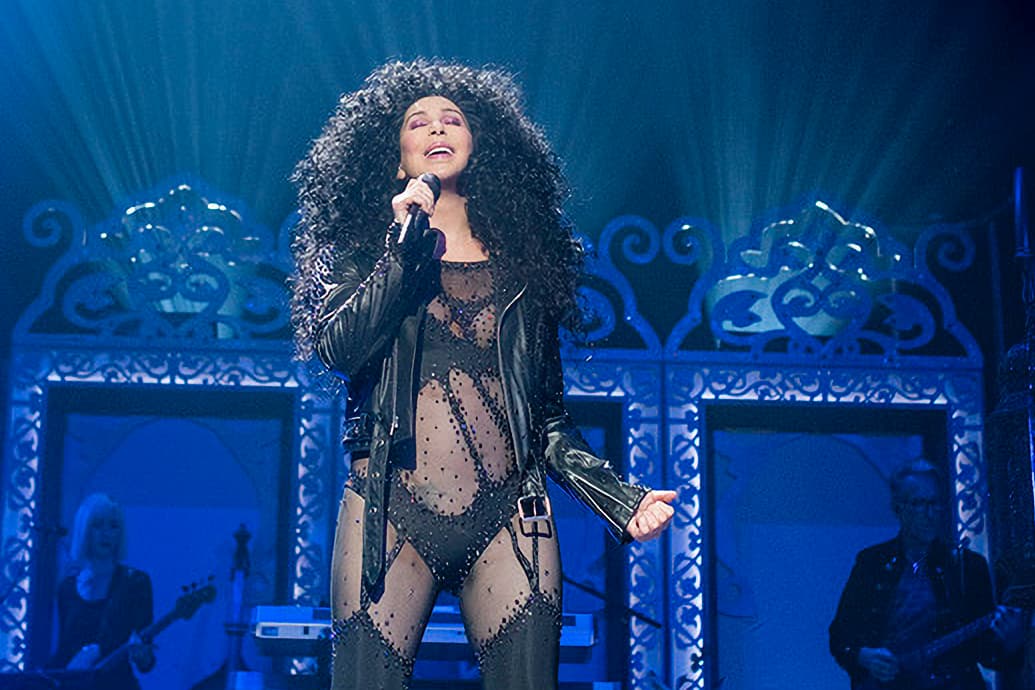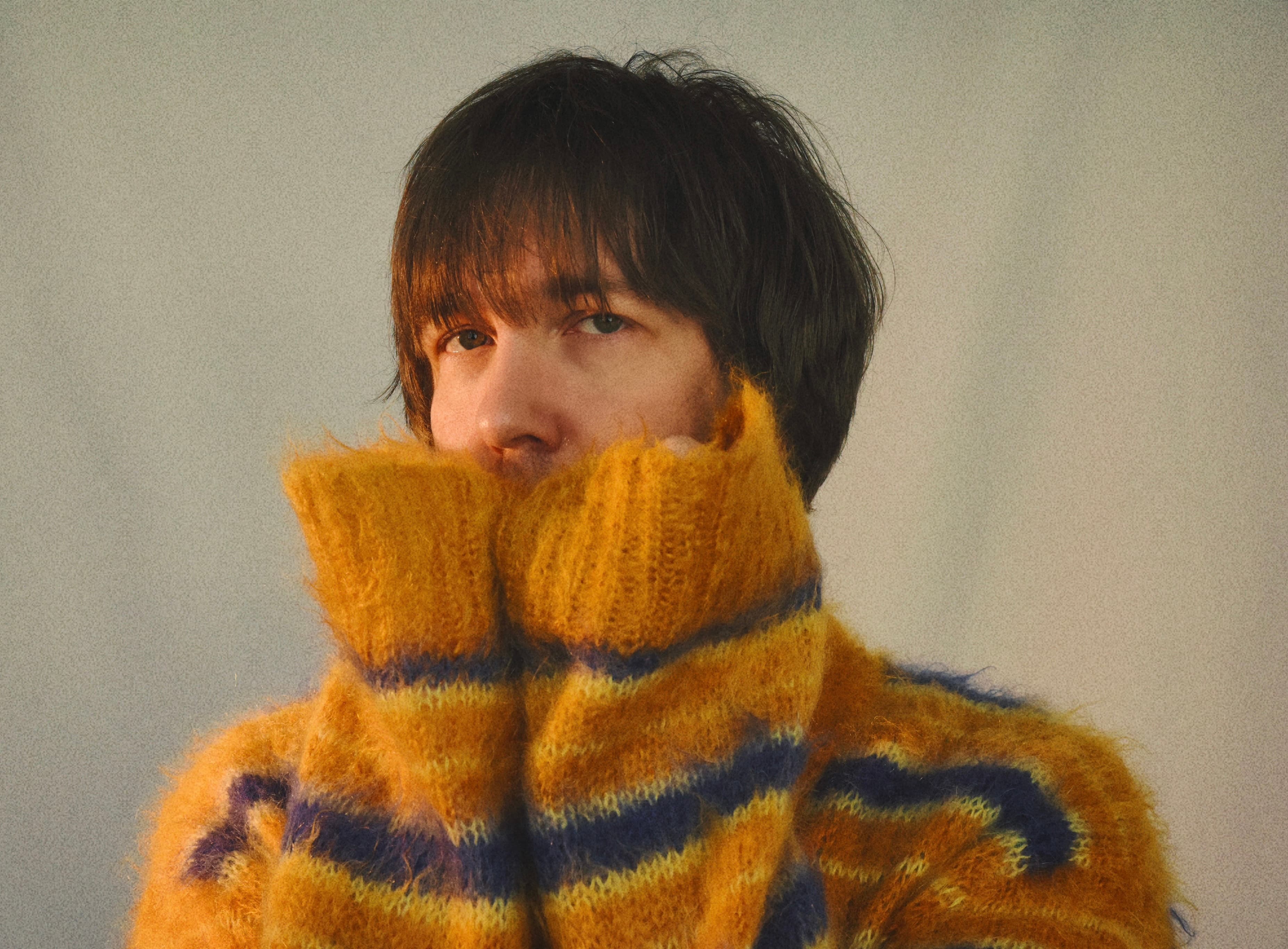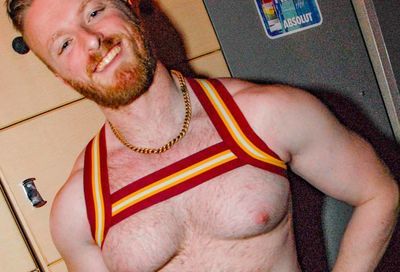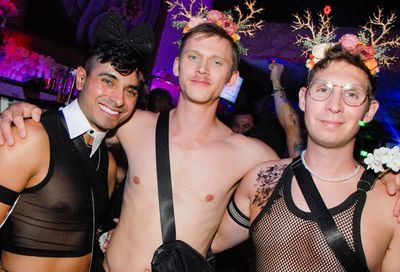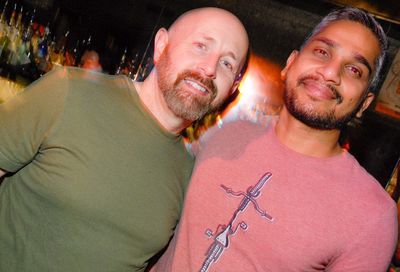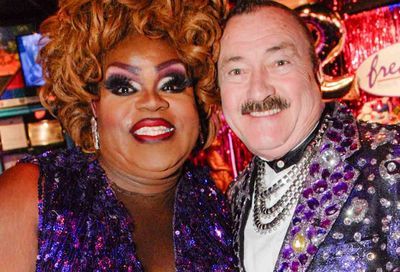Nathaniel Banks on Arlie’s Big, Bold, Swinging ’60s Sound
The Arlie frontman on his approach to music, his warmth for the LGBTQ community, and his stunning mop of curls with a life of their own.

The very first time you listen to Break the Curse, the magnificent, captivating debut from Arlie, it’s impossible not to feel as though you’ve uncovered something big, profound, unique — as well as secret, an album made for your ears, your sensibilities, your gratification only. It feels intimate and personal and also larger-than-life.
As you wind your way through Break the Curse‘s eleven tracks — which frequently recall the lively, day-glo pop of the sixties filtered through the bold electronics of today — the ebullient, sumptuous melodies get their hooks into you. It becomes impossible not to listen again. And again. And again.
Individual loyalties shift, as they so often do when listening to an album set on repeat for days, and certain musical complexities start to burst through Arlie’s clever deployment of a wall of booming sound. Favorites emerge only to be replaced, in a fickle state of listening glee, by new favorites.
One day you might favor the swirling, explosive “cool,” which so thoroughly evokes the hip, swinging sixties, you start to have visions of Twiggy, mini-skirts, and Laugh-In.
Another day, the power-rock ballad “karma” takes hold, its soaring vocals and pinpointed guitar pings finely detailing the song’s overall tendencies toward sonic boom.
Then, somewhat improbably, your loyalties shift to “landline,” indisputably the album’s catchiest song and a pure callback to the glory days of bubblegum pop, filtered through an elaborate set of tricky rhythms and precisely-honed instrumentation.
Break the Curse is just that kind of amazing discovery album. And Arlie is just that kind of amazing discovery band. They hook you and keep you.
Arlie was founded by Nathaniel Banks, whose lead vocals are energetic and youthful, plugging directly into an emotional charge that brings his song’s narratives to vivid, joyful life.
The 28-year-old Banks, who grew up in Burke, Virginia, before departing for Nashville, recently took time to talk with Metro Weekly about his approach to music, how the band’s album cuts differ from its stripped-down live approach (“it’s a different art form”), his visible nods to the LGBTQ community in Arlie’s videos (watch the wild, lo-fi “cool” and be swept away), and how he maintains that stunning mop of curls that, at times, have a personality all their own.
METRO WEEKLY: I understand you’re doing back-to-back interviews. How’s that experience?
NATHANIEL BANKS: It’s fun. My car is about to be out of gas, I’m like having to pee, I’m on my way traversing from one appointment to the next — so it’s slightly more frenzied than I would ideally prefer to be in when I’m communicating about my art. It feels high stakes to me. But it’s all good. And I’m happy to have the opportunity and that people care to hear what I have to say about our music.
MW: Can you give me a short history of Arlie?
BANKS: So Arlie is a project that is an extension of me. It was born out of a former solo project that I was tired of. I was prompted to learn how to produce music myself because I was working with some other producers — I was saving up from working at an ice cream shop to try to pay these guys to produce tracks — and I just realized, “Okay, this isn’t as complicated or as hard as it might seem, and I think I could learn how to do this myself and then be able to make the sounds that I’m hearing in my head and make the kind of music that I would really want to listen to.”
It took a few years of experimenting and watching other people do it, before I felt like I was finally starting to make stuff that I was proud of.
And as sort of like a bedroom producer and artist, that’s when I decided, “Okay, it’s time to have a name for this that is not my birth name. It’s time to put a band together so that we can perform it live. And so that’s what I did. It came together surprisingly quickly. I was able to rally some friends together to play the music and rehearse and just started playing every house show that we could around Nashville and just any DIY gig that we could get in the scene here. Within a few months of doing that, I finally put out the first couple of songs and was received really well on the internet. It suddenly was a real thing out in the world very quickly.
The way I look at it, I’ve been working towards Arlie my entire life. But it didn’t take on the name Arlie until 2017. And then, from there, it became this sort of hybrid thing where it’s a solo project more when it comes to the writing and the recording, but it’s much more like a band when it comes to the live show — a collaborative group spirit energy.
MW: Is there a special significance to the name Arlie or did it just come to you out of thin air?
BANKS: I knew that I wanted to have a name that felt like a blank canvas, that didn’t have a ton of things associated with it. But I was also looking for a name that felt sort of youthful. I liked Arlie because it felt youthful and also it could go either direction on gender and it could kind of not be in a box.
I found it because of my friend, Sam Boyette, who I’ve done a lot of music videos with. It was the name of his short film that he was doing as his senior thesis. He was a film major, and I just asked him, do you mind if I name my project this?
So anyways, it came from Sam. And he chose it because, funny enough, he just wanted to do this transition with one of those movie signs with the letters that you move around. And he wanted it to say Arlie as the main title, and then two kids come up on either side and put an “E” on one side and an “R” on the other side. So it says “Earlier,” and then he cuts to a flashback. That was what prompted him to choose the name.

MW: When you listen to Break the Curse from start to finish, the range and variation you achieve is almost startling. I’m trying to sound more musically intellectual than I actually am, but every song has its own personality and its own dynamic. On, say, “cool,” at first I thought my headphones were malfunctioning because the sound suddenly went muffled — but then it bursts into clarity, catching you by surprise. I literally jumped the first time. When listened through headphones, the album feels at times like a huge sonic wall of sound coming at you from all sides.
BANKS: That’s all intentional and that’s kind of exactly the experience that I would’ve hoped that somebody would have. Like you’re not quite sure how to interpret what you’re hearing, and then you sort of let it happen to you and then it takes you somewhere. So that’s great to hear. That means that we’re achieving the desired results.
I think the extreme filter sweep that’s in the beginning of “cool” comes out of just experimenting. A lot of times you hit on something by accident. And then you listen to it again as if it was intentional and then you’re like, “Holy, shit! That’s what it has to be.”
I want to create this big wall of sound and I want to make things pump all compressing against the kick drums so that you’re getting this feeling like you’re being punched in the chest or whatever. And sometimes it is thought out and intentional in that way, but sometimes it’s just experimenting and then finding an experience that you like and then committing to it and leaning into it.
MW: There is very definitely an influence in your style to bands from the late sixties. There are cuts that feel like they could have come directly from the year 1968. Songs like “wait a minute.”
BANKS: So that’s definitely the golden era for me, those late sixties years. That’s like Golden Age of Music with guitars for me, for sure. So The Who, The Zombies, the Kinks, The Beatles, the late Beach Boys psychedelics sort of era, and Brian Wilson right before he lost his mind. That’s gold to me. People don’t have to know the references to hopefully just have the experience. But then it’s nice when people do and appreciate it.
MW: There are definitely some direct nods to The Monkees.
BANKS: I think The Monkees are underrated. Did you ever hear The Monkees song The Porpoise Song? It was actually, I think it was written by Carole King, but The Monkees did it for their movie. That one I’ve just been obsessed with lately.
MW: The Monkees actually were a lot better as a musical group than we sometimes give them credit for. I mean, they had Michael Nesmith….
BANKS: My dad always would criticize The Monkees and say, “The Beatles are great. The Monkees are cheap imitations.” But I listen to The Monkees now and I’m like, this is great music. So, I don’t know, it stands the test of time in a way.
MW: How do you translate the album experience into a live show? Do you even try?
BANKS: That’s a great question. I used to try to translate it in a direct way, and now I’ve sort of embraced that it’s a different art form, so you can’t really expect it to come off the same.
What I hope for is just the best of what these songs can do in a very different context — which is a five-piece band in a club. A lot of these recordings will have 200 tracks, and a lot of them are subtle things and effects and processing and layers of stacks of 15 vocals or something like that.
There’s infinite possibilities for that now in electronically recorded music. I used to use a lot of backing tracks live to try to recreate the recordings, and I realized it still doesn’t come off the same.
So now we’re not using backing tracks now — and I don’t think there’s anything wrong with bands using backing tracks, I really don’t. But we’ve decided not to because we just like to be able to not be on a metronome and just be able to react to each other and react to the room and react to how we’re feeling, that we realize that’s what we like about a lot of our favorite live shows. I’ve got a band of musicians that are able to do it, and we have more fun that way.
So that’s what my answer is: it’s a different art form. It’s the same songs and it’s the same songwriting, but in the medium of a five-piece rock and roll band in the club.
Also, we try to create a participatory experience. The thing that we love about our live shows is you’re interacting and there’s an energy that you can feel, a way of making people feel connected and able to express themselves through these songs. The audience can sing along and have this participatory sort of experience. And so yeah, it doesn’t sound just like the record, but I think it’s really fun.

MW: One the things that caught my attention in the video for “cool” — which is a delight to watch, by the way — are the instances of you playing the saxophone while wearing a sundress. It almost feels like a beacon to the LGBTQ community: “Hey, we want you to listen to us. We welcome you.”
BANKS: I would hope that, yes, we are creating a safe space for the LGBTQ community. That’s definitely something that I care about.
I think fans that pay attention to how I express myself, whether that be at shows or on the internet… I don’t know, I tend to not be as loud maybe about that sort of subject matter, and for a number of reasons, but I definitely do intentionally send signals, I guess, that it’s welcome and that it’s a part of myself and how I express myself. And I think it’s cool when people pick up on it.
It’s something that’s important to me, and it’s something that, at least at this stage of my life, it’s important to me in a way that’s more expressed privately amongst my friends and close people in my life. But I will say queerness is a part of my identity, and I’m still figuring out what that looks like.
And I think it’s always cool to see — for me, when I’m looking at artists that I admire — different ways of expressing gender, sexuality, and all the above, so that people don’t feel like there’s one way to be queer, and you’re either this or you’re that.
It’s always cool for me, when I’m looking for models of different ways to express yourself, to see a variety. And so I just hope that I’m just one other way that someone can express themselves and maybe it provides some sort of encouragement to other people looking for ways to express themselves and ways to connect. So that’s all I’ll say for now.
MW: Are you working on a second album, and do you have a rough idea so when that would come out?
BANKS: Yes. I’m working on it and I don’t have an idea of when it’s going to come out. But I’m definitely working on it.
MW: Final question: Your hair is extraordinary. It almost seems to be a lifeform all its own. How do you maintain it?
BANKS: [Laughs.] Well, I mostly don’t wash it with shampoo. I rinse it when there’s sweat in it, and I’ll use conditioner when it gets overly tangled. And I use a leave-in conditioner spray. That’s pretty much it.
I will kind of bend down so that my hair hangs and my head is sort of upside down, and I’ll scrunch it and let it sort of naturally fall with a little bit of water when I need to unflatten it. That’s mostly it, though. I find the more I obsess over it, the worse it looks. I’ve spent years learning to not obsess over it, because that tends to ruin it.
Arlie is currently on tour with stops planned for Washington, D.C.’s Union Stage (Feb. 8), New York’s Bowery Ballroom (Feb. 9), The Basement in Columbus, Oh. (Feb. 16), and Teragram Ballroom in L.A. (March 2). For all tour dates and to watch their videos, visit www.arlie.band.
The album Break the Curse is available for purchase and on most major streaming platforms. Visit www.arlie.band.
Support Metro Weekly’s Journalism
These are challenging times for news organizations. And yet it’s crucial we stay active and provide vital resources and information to both our local readers and the world. So won’t you please take a moment and consider supporting Metro Weekly with a membership? For as little as $5 a month, you can help ensure Metro Weekly magazine and MetroWeekly.com remain free, viable resources as we provide the best, most diverse, culturally-resonant LGBTQ coverage in both the D.C. region and around the world. Memberships come with exclusive perks and discounts, your own personal digital delivery of each week’s magazine (and an archive), access to our Member's Lounge when it launches this fall, and exclusive members-only items like Metro Weekly Membership Mugs and Tote Bags! Check out all our membership levels here and please join us today!




